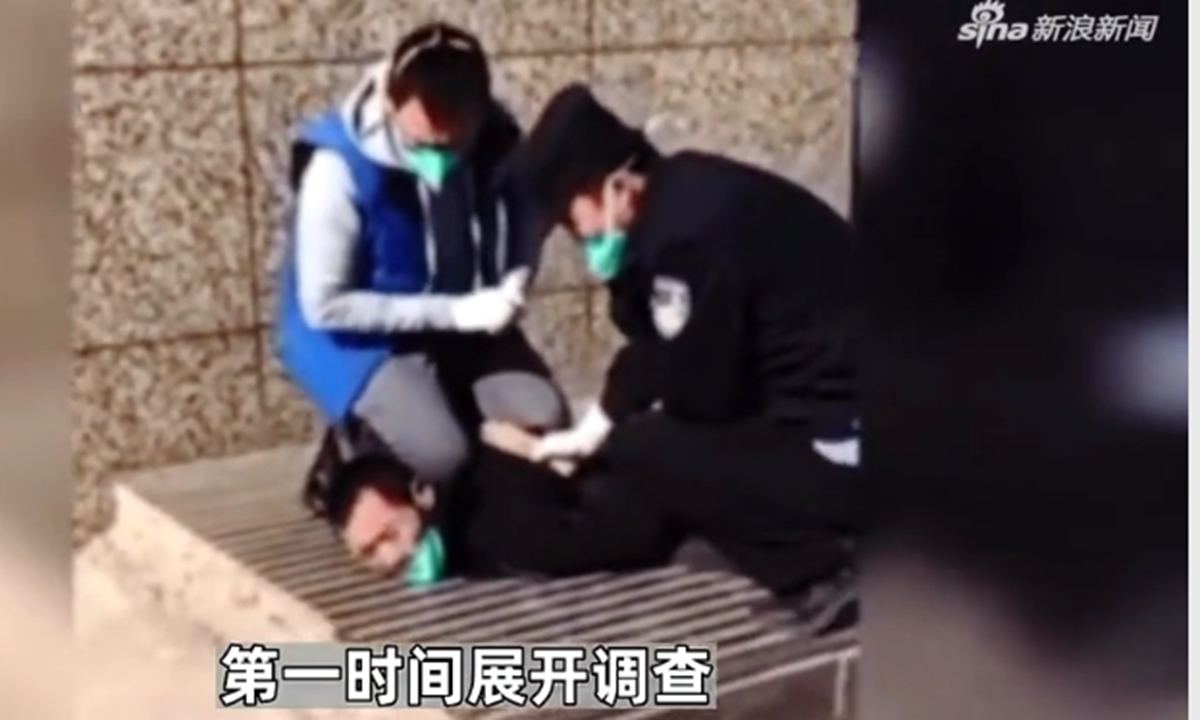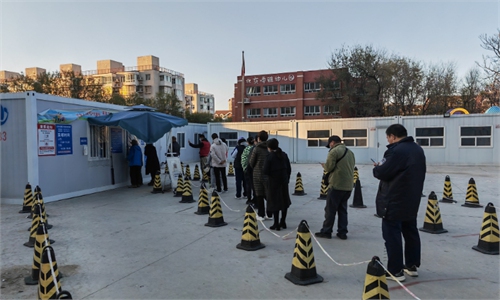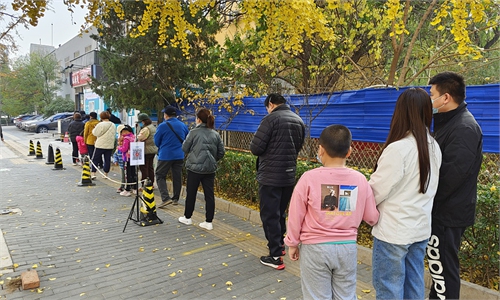It’s hoped ‘blue vest incident’ will further promote civilized law enforcement: Global Times editorial

Screenshot Photo
The headquarter for epidemic prevention and control work in Xingqing district, Yinchuan, Northwest China's Ningxia Hui Autonomous Region, issued a notification on Tuesday responding to an online video of "epidemic prevention personnel pressed and held a man to the ground." According to the notification, the incident occurred on November 1. In the video, the man in black surnamed Peng, was a close contact in the high-risk area. He was stopped by the police on duty after leaving a quarantine room without authorization. Peng claimed that he suffered from a mental illness, acting emotionally with his hands in pockets. To prevent him from carrying dangerous items, the police searched and controlled him and then sent him back to the room. A staff member accompanied him to the hospital for treatment that night. Peng was released from centralized quarantine on November 4.The video attracted widespread attention. From the content of the video circulating online, an epidemic prevention worker in a blue vest held down a man in black on the ground, and the man claimed that he needed to buy medicine. If people only watch this video clip, it is easy to trigger the public's imagination that "the man was going out for medical treatment during quarantine but was brutally stopped." The latest notification of Yinchuan restores the ins and outs of the incident and provides more dimensions for people to view this incident.
As of the identity of the "man in blue vest," which was a widespread concern among Chinese netizens, the notification responded that he is a police officer from Yinchuan public security agencies helping to preserve order during epidemic prevention work, and the other two uniformed personnel are police officer and auxiliary police officer. The notification also stated that for the law-enforcement problems that occurred during the process, the officers involved have apologized to Peng in person and reached an understanding. At present, relevant departments have set up a team to conduct investigations, and will deal with the issue seriously according to the law and regulations based on the investigation results, and they're "deeply sorry for the adverse social impact caused by the incident."
We believe this notification is practical, realistic and sincere, and will help people view the issue objectively and comprehensively. Past experience shows that the controversial pictures spread on the internet are often just one side of the matter. The sooner and more comprehensive the official statement comes, the more beneficial it is to resolve related disputes. In this incident, whether the police officers involved were excessively enforcing the law remains to be further investigated, and we believe that the local government will give a fair result.
It should be pointed out that the more serious the epidemic is, the more civilized law enforcement needs to be implemented. In 2020, the Ministry of Justice of the People's Republic of China issued a document, clearly calling for civilized law enforcement to ensure the unity of legal and social effects of administrative law enforcement. It specifically mentioned the need to "pay attention to language and behavior norms, eradicate rough and blunt law enforcement, avoid intensifying conflicts and causing confrontation and conflicts," as well as to "fully consider the public sentiment during the epidemic prevention and control period." The Legislative Affairs Commission of the Standing Committee of the National People's Congress also stated that strict law enforcement is by no means "violent law enforcement" or "excessive law enforcement." The means of law enforcement officers should be procedural and rationalized, and the principle of proportionality should be emphasized. They cannot treat ordinary people with the means of dealing with crimes. Otherwise, it will not only violate the original intention of epidemic prevention, but also damage people's confidence.
Putting people and life first is where the original intention of China's epidemic prevention policy lies. Whether it's during the concrete work of epidemic prevention and control, or in the law enforcement amid the epidemic, it's necessary to act properly, explain the reasons to the public in a timely manner and avoid simplicity and rigidness. Recently, a man in Baoding, Hebei Province, forced through a COVID prevention checkpoint to buy milk powder for his child. Considering his special situation, the local public security agency only fined him 100 yuan ($14) and the man also cooperated. At the same time, relevant authorities helped him acquire the milk powder for his kid. Such a way of tackling the issue won comprehension and praise from the public. There are many similar cases. Being speedy, effective and warm is the nature of our epidemic prevention and control policies.
At present, new outbreaks continue to emerge, and in some areas the virus is spreading in an accelerating speed, and the risk of rebound is increasing. The prevention and control situation is still complicated and severe. All areas in China have made a lot of efforts, and their hard work can be seen by the public who have given them a high degree of cooperation. This is an important advantage of China's fight against the epidemic. It is hoped that all parties will take the "blue vest incident" as an opportunity to further improve relevant work, enhance grass-root governance capabilities and civilized law-enforcement capabilities while carrying out epidemic prevention and control according to law, so that they can better win the public's recognition and understanding to win this tough battle.


